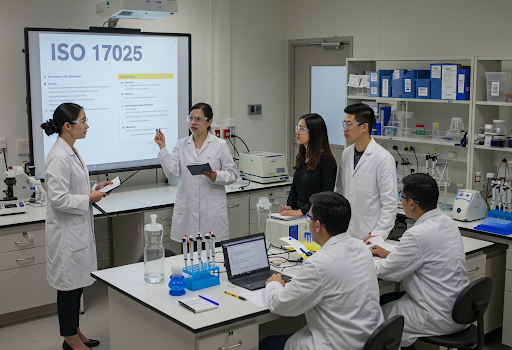 Business
Business
ISO 17025 Training: A Must-Have for Quality Assurance and Quality Control Teams
- by unnamalai
As a member of a Quality Assurance (QA) or Quality Control (QC) team, your role is all about precision, consistency, and ensuring that every measurement or test you conduct is reliable and repeatable. You’re the backbone of your company’s quality management system, and the results of your work have far-reaching implications—whether it’s the safety of a product, the accuracy of scientific research, or the reputation of the company you represent. So, here’s the big question: are you equipped with the best tools and knowledge to meet those high standards? One of the most powerful tools at your disposal is ISO 17025—the international standard for the competence of testing and calibration laboratories.
But why exactly should ISO 17025 training matter to you? In short, it’s the difference between merely meeting minimum requirements and truly excelling at your craft. By undergoing ISO 17025 training, you gain the knowledge to help your laboratory perform consistently at the highest levels of accuracy and reliability. Ready to take your QA/QC game to the next level? Let’s break it down.
What is ISO 17025 and Why Does it Matter for QA/QC Teams?
ISO 17025 is a comprehensive standard for laboratory management and technical competence. It’s widely recognized as the global benchmark for ensuring that testing and calibration labs deliver results that are accurate, reproducible, and reliable. While it’s mainly associated with labs, the standards set forth by ISO 17025 are crucial to anyone involved in processes that rely on precise measurements.
For QA/QC teams, ISO 17025 is your guidebook for maintaining a solid, scientifically sound laboratory environment. The training doesn’t just teach you the what but the how. How do you set up systems to monitor and improve your processes? How do you ensure that all equipment is calibrated correctly, and tests are done according to best practices?
The training covers everything from the technical side—like measurement uncertainty and instrument calibration—to the management side, such as record-keeping, auditing, and continuous improvement. Without this knowledge, your lab could run the risk of producing results that are inconsistent, inaccurate, or untrustworthy. And as you know, in QA/QC, those risks are simply too high to take.
What You’ll Learn in ISO 17025 Training
Wondering exactly what you’re going to gain from ISO 17025 training? Here’s a sneak peek at some of the key topics that will not only sharpen your skills but also help you strengthen your laboratory’s processes:
1. The Structure of ISO 17025
ISO 17025 is built around two main components: management requirements and technical requirements. The training will break down each of these sections so you can fully understand how they apply to your daily work. You’ll explore:
- Management Requirements: These include having clear policies, well-maintained documentation, and robust processes in place to guarantee consistency and transparency.
- Technical Requirements: This is the heart of the standard, covering everything from testing and calibration methods to ensuring that you have the right equipment, staff, and systems to generate reliable results.
Understanding both sides helps you create a system that’s well-rounded—both in its processes and its technical competence. This balance is key to avoiding gaps that could lead to errors or inefficiencies.
2. Measurement Uncertainty
Ever hear the term “measurement uncertainty”? It’s one of the most critical concepts you’ll learn about in ISO 17025 training. Simply put, it’s the margin of error inherent in any measurement process. This is not just a concept; it’s something you will practically apply. You’ll learn how to quantify, document, and minimize measurement uncertainty in a way that’s scientifically valid and aligned with the ISO 17025 requirements.
3. Equipment Calibration and Maintenance
QA/QC teams rely heavily on accurate instruments. The quality of your testing and calibration depends on ensuring that your equipment is always in good working condition. ISO 17025 training will show you how to:
- Establish calibration schedules.
- Track the calibration history of your equipment.
- Perform regular checks to ensure accuracy.
You’ll gain the tools to minimize downtime and avoid costly mistakes by keeping your equipment in top shape.
4. Internal Audits and Non-Conformities
Internal audits are a huge part of ISO 17025. After all, continuous improvement is one of the core principles of the standard. You’ll learn how to conduct thorough audits, identify any non-conformities in your processes, and take corrective actions. This ensures that your lab doesn’t just meet the minimum requirements but continuously strives to improve.
Audits may sound tedious, but honestly, they’re your safety net. They help you catch issues before they become bigger problems—like a test result going out to a client with significant inaccuracies. They’re also a way of demonstrating your lab’s commitment to quality when it comes time for external audits or certifications.
5. Documentation and Record Keeping
Here’s something many QA/QC teams are already familiar with: documentation. However, ISO 17025 training takes it to the next level. Proper documentation is more than just making sure you don’t lose track of anything—it’s about ensuring transparency, traceability, and accountability. ISO 17025 requires that you maintain clear records of your methods, tests, and calibrations, which can later be used to verify the results or retrace steps if anything goes wrong.
Why Should QA/QC Teams Prioritize ISO 17025 Training?
ISO 17025 is not just another certification to get—it’s a foundational element of ensuring that your testing and calibration processes consistently deliver results you can trust. But you may be asking, “Why does it really matter to me as part of a QA/QC team?”
1. It’s About Trust
In the QA/QC field, trust is everything. You’re essentially the gatekeepers for the accuracy and reliability of your company’s data. A small mistake can snowball into significant issues, whether that’s a product failure, a regulatory non-compliance issue, or even harm to a customer. ISO 17025 ensures that your processes, tools, and staff are all performing at their best—helping build trust with your stakeholders, customers, and clients.
2. It’s About Efficiency
Efficiency isn’t just about getting things done faster; it’s about getting things done right the first time. When you have ISO 17025 standards in place, there’s less room for errors. The systematic approach helps streamline operations, reduce rework, and avoid unnecessary delays. That’s time and money saved—critical in today’s fast-paced industries.
3. It’s About Continual Improvement
Here’s the thing: ISO 17025 isn’t just about following rigid rules. It’s a living document. The standard encourages you to consistently evaluate and improve your processes. That’s why ISO 17025 training isn’t a one-off task—it’s about embedding a mindset of continuous improvement into everything you do. You’ll learn how to spot opportunities for better efficiency and precision. And guess what? This helps keep your lab at the cutting edge.
4. It’s About Competitive Advantage
ISO 17025 certification isn’t just a piece of paper—it’s a mark of quality and competence that gives you a competitive edge. Clients, regulatory bodies, and partners are more likely to choose a lab with ISO 17025 accreditation because they know it ensures high standards. Having a team that’s trained and competent in the standard will help your lab maintain that edge and attract more business.
Conclusion: ISO 17025 Training—Your Path to Excellence
As a QA/QC professional, you play a crucial role in ensuring that the products, services, or research your company delivers are of the highest possible quality. With ISO 17025 training, you’re not just learning a set of rules—you’re gaining the knowledge, skills, and confidence to elevate your laboratory’s performance and take it to the next level. Whether you’re dealing with calibration, testing, or auditing, ISO 17025 gives you the framework to ensure that your results are always accurate, reproducible, and trustworthy.
So, what’s holding you back? Invest in ISO 17025 training and empower yourself and your team to operate at the highest level of precision and professionalism. After all, quality isn’t just what you do—it’s who you are.









